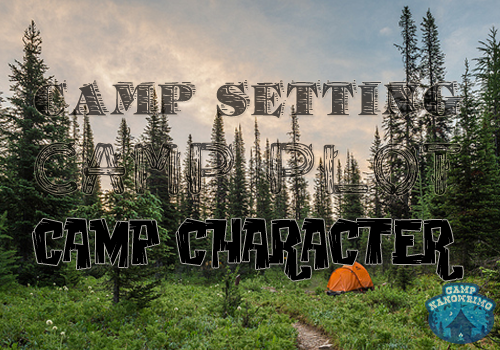Choose Your Camp: Practicing Empathy for Your Characters

Camp NaNoWriMo begins in April! In the spirit of friendly camp competition (and inspired by one of our favorite scenes in Scott Westerfeld’s Afterworlds), we asked our friends to Choose Your Camp. Today, W. C. Bauers, author of Unbreakable, shares why writing characters is all about listening:
I’m drawn to character-driven narratives so bunking at Camp Character was the obvious choice. Besides, the campers in Plot wouldn’t stop playing Elvis’s “A Little Less Conversation (A Little More Action Please)”. I walked in, heard that, and turned around.
Then I headed toward Setting. As I approached the cabin a few campers saw me rubbing my hands together for warmth and waved me over to the fire. But they wouldn’t stop stoking the flames with adverbs. It was a lovely fire, but the crackle of “lys” was overwhelming.
Character is irreducibly complex. The build-a-bear method of developing character sounds promising enough, but it never worked for me. Writing character is less about assembling a list of traits about your protagonist, and more about going on a journey with her, getting inside her head, and listening to her before writing about her. Perhaps most of all it’s about practicing empathy.
When I first sat down to write Unbreakable, all I had was my main character, Promise. She’d just come of age. She was thinking about her future and what she might become. Then raiders hit her home world and murdered her father. Because she’d lost her mother years before and had no other family to speak of, Promise didn’t know what to do. She was traumatized and angry. She came to me looking for an out. I wanted to tell her story.
Unbreakable started that way. Me listening; Promise speaking. She told me she was tired of living like this and that she didn’t think she could go on. I suggested she join the Marines, get off-planet and see the ‘verse, and live life on her own terms.
I’m leery of methods or proscriptive approaches to writing characters. I just don’t think a one-size-fits-all works. Writing a synopsis is straightforward enough: start at A and by the end of the novel your protagonist better be at Z or she’s in a world of hurt, and you as a writer have an unfinished, unsaleable book.
Writing an engaging character is altogether different, even counterintuitive. It’s a process of discovery. My agent gave me some wonderful advice about this, really the best I’ve heard on the subject. She told me to write my first draft to get to know my characters. Then, go back and revise with the benefit of hindsight.
Characters are like real people. They grow and change. I had to take that into account as I edited Unbreakable and prepared it for outside eyes.
I’d also recommend practicing self-doubt as you write dialogue. We all know the saying about showing verses telling. Good writers show while they tell—at least that’s what I’m striving for—and they don’t blindly tell their characters what to do, what to say, or how to say it. Rather, they let their characters speak for themselves.
Character is voice. As I wrote Unbreakable, I kept asking myself if Promise would say this or that. Would she say it with different words, or a different tone of voice? How? The last thing I wanted to do was put words into her mouth and trample her unique voice.

W. C. Bauers’s interests include Taekwondo, military history, and French-press brewing. He lives in the Rocky Mountains with his wife and three boys.
Unbreakable
is his first novel.
Top photo by Flickr user WherezJeff.
Chris Baty's Blog
- Chris Baty's profile
- 63 followers



